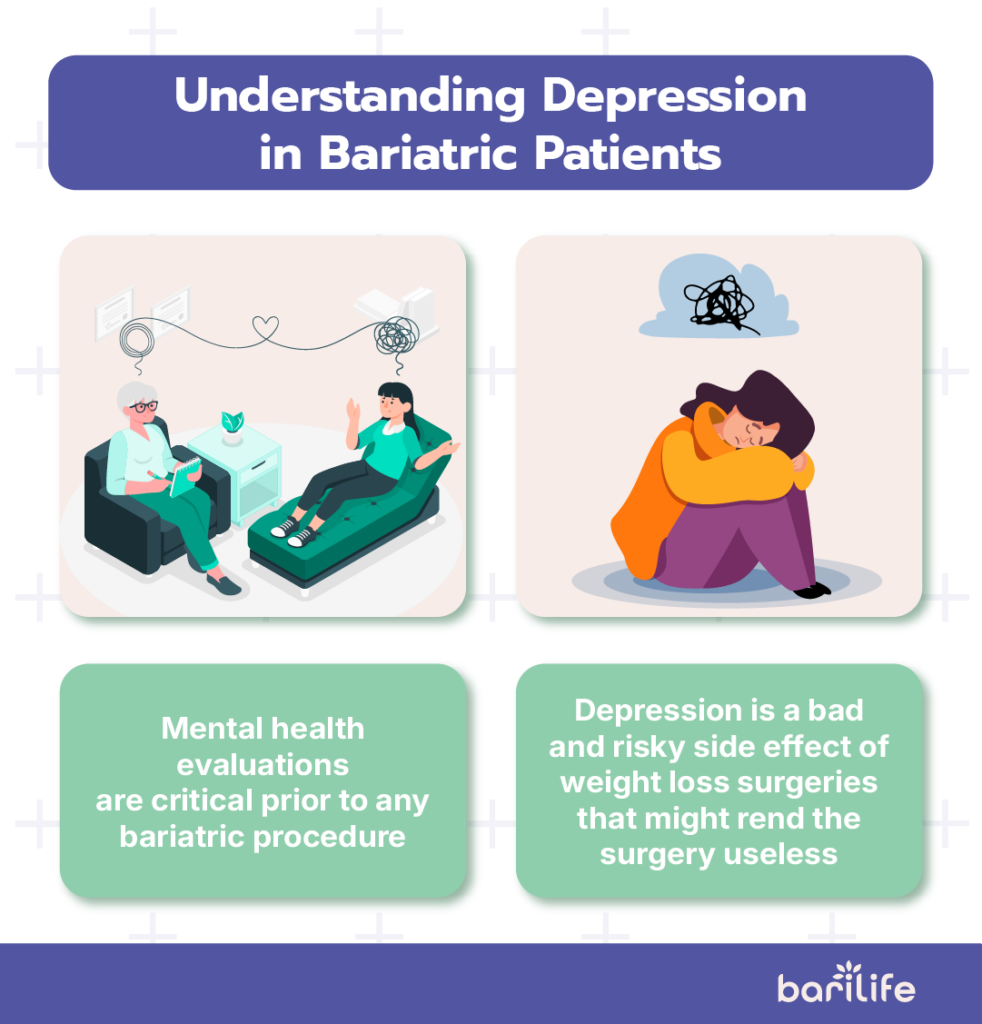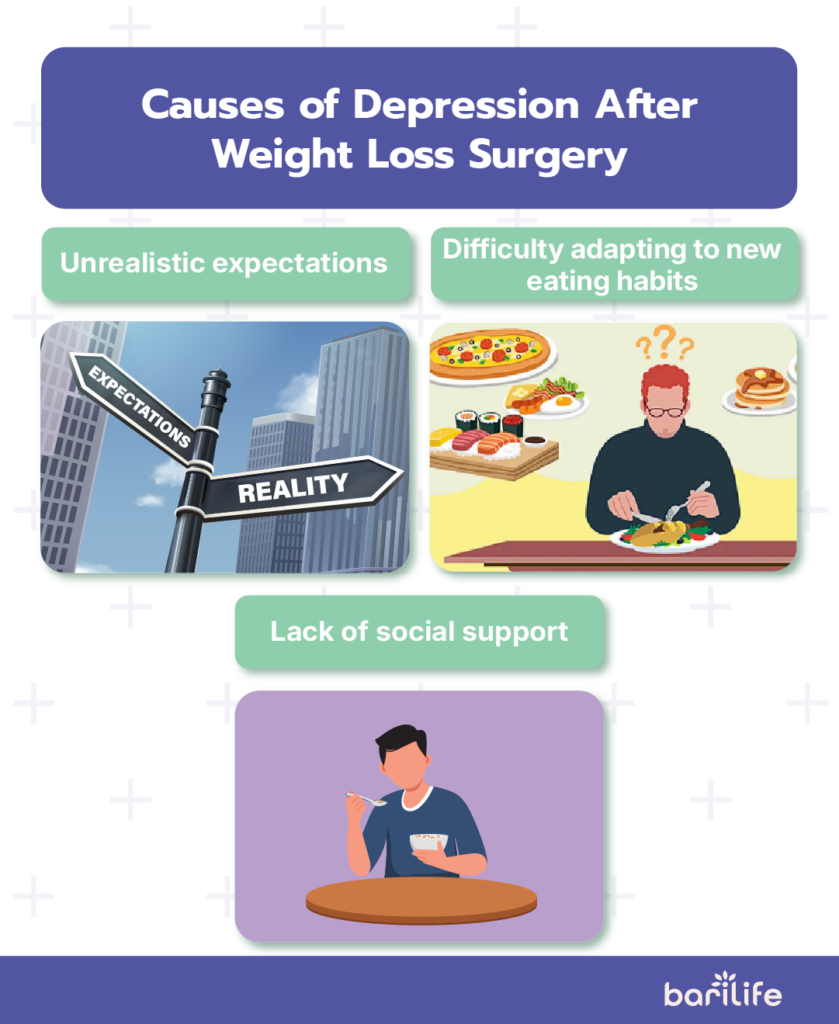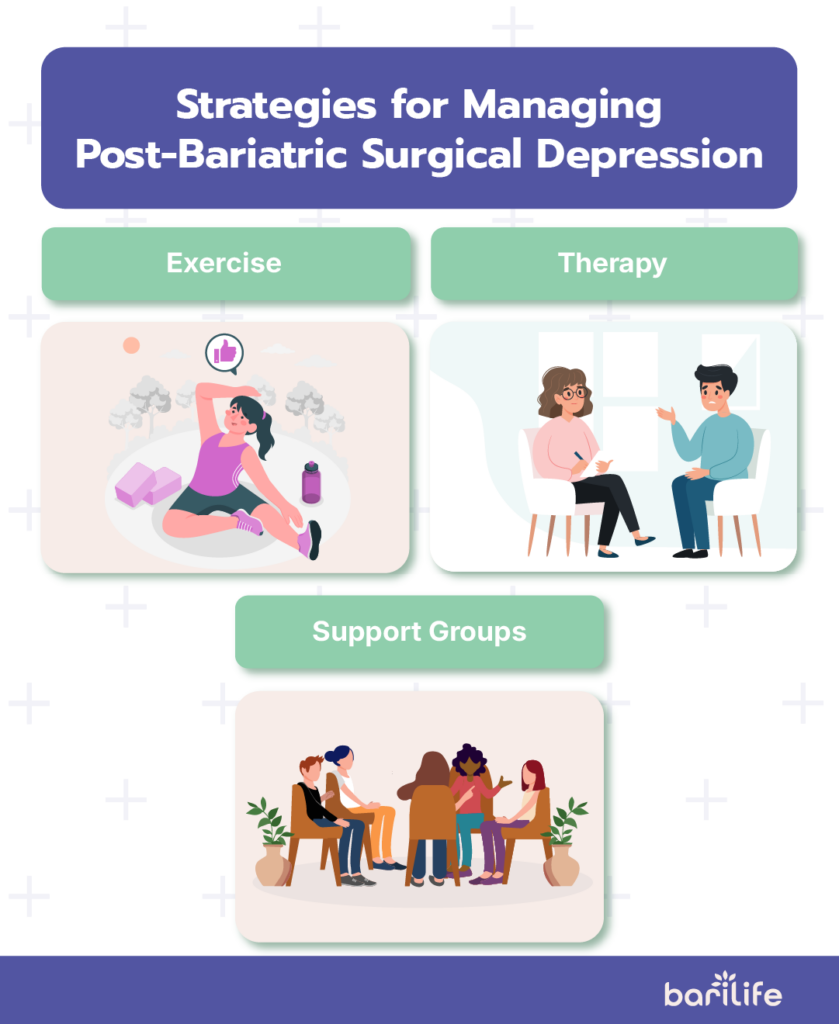Depression after bariatric surgery is often overlooked in the weight loss journey. The procedure can change the body and improve health. But, it can also cause serious emotional and mental issues.
For some, big lifestyle changes and unmet hopes can cause sadness or even depression. It’s vital to spot the warning signs. This helps with early intervention and well-being.
In this article, we’ll explore the common symptoms of post-surgery depression, why it happens, and steps to seek support if you or a loved one are struggling.
Table of Contents
Understanding Depression in Bariatric Patients

Mental health evaluations are critical prior to any bariatric procedure. Research shows that individuals that seek bariatric surgeries often exhibit higher rates of depression compared to the general population. This may be because there is a high prevalence of depression among individuals with obesity.
So, depression is a bad and risky side effect of weight loss surgeries. Those with depression before surgery could struggle to lose weight after. This may make surgery both painful and useless. Late complications of bariatric surgery, such as depression, must be closely monitored.
Research shows that pre-existing depression can have adverse effects on the results of the surgery.
During the recovery phase, it’s important to maintain proper nutrition. Incorporating bariatric vitamins and bariatric multivitamins into your routine can support both physical and mental health. Additionally, using bariatric calcium chews or a liquid bariatric vitamin ensures proper nutrient absorption, which can help manage mood swings and energy levels.
This is why there is a strong need for a comprehensive approach when it comes to bariatric procedures. Both physical and mental health support are vital for the well-being of bariatric patients.
Prevalence of Depression Post-Bariatric Surgery
Depression is not only a symptom one can experience prior to surgery. Some individuals experience depression after going through bariatric procedures. After surgery, about 15.3% of bariatric patients experience depression.
While seemingly small, these figures are significant. Depression after surgery can have profound implications, not only on mental well-being but also on the physical and behavioral outcomes of the procedure.
Research shows that depression after bariatric surgery is associated with weight regain. Many who get depressed after surgery become more distressed. Their surgery is ineffective. Depression after surgery also has been linked to eating disorders.
This shows how vital ongoing psychological support is. Psychological problems after bariatric surgery, such as depression, anxiety, or even Alcoholism after Bariatric Surgery, highlight the need for comprehensive care.
And bariatric surgery can greatly affect one’s relationship with food. If depression is also an issue, it can be hard to overcome these challenges.
This is why monitoring is so important. After surgery, we must check for depression and treat it. Your doctor should screen you for depression after surgery. Do it often. If your provider suspects you are depressed, seek help right away.
Causes of Depression After Weight Loss Surgery

There are many causes of depression after weight loss surgery. For one, it’s possible that unrealistic expectations about surgical outcomes can lead to disappointment. This could cause depressive symptoms if these anticipated post-surgical results are not achieved. Patients may ask, “What is the most common complication of bariatric surgery?” The answer often involves both physical and emotional struggles, including depression.
Additionally, adapting to the new way of eating can be challenging. There are a lot of adjustments that need to happen in your life after surgery. These new habits might cause emotional distress and lead to depression.
Lastly, social support is very needed. If you lack social support, you may be more at risk for depression. After surgery, you may be more prone to depression without support.
Potential for Improved Emotional Well-Being
While some people experience depression after bariatric procedures, others experience a positive mood lift. Research shows that many patients experience a decrease in depressive symptoms following weight loss surgeries. This is likely due to improved self-esteem and physical health that results from bariatric procedures.
In the same vein, many experience an enhanced quality of life. Significant weight loss can lead to better mobility and even improved social interactions. Both of these can contribute to an improved emotional well-being.
Research even shows sustained mental health benefits. Long term studies indicate that psychological improvements after bariatric surgery can last. This is especially true with ongoing social support and a healthy lifestyle maintenance.
Strategies for Managing Post-Bariatric Surgical Depression
Looking for techniques to manage or prevent post-surgical depression? One way to boost your mood is to engage in exercise. Research shows that physical activity can boost mood and aid in weight management. This makes exercise a protective factor against depression. While adjusting to your new body in the postoperative period, even simple gentle walking can benefit your mood.

If you’re feeling low after bariatric surgery, seek therapy. It’s a good step. Professional counselors or therapists can help. They can provide coping methods for your unique experiences. This will help you adjust to your new body and lifestyle. This support can help manage emotions and unmet expectations. It can also foster a healthier mindset in recovery.
Therapy provides a safe space to explore feelings. It helps identify triggers for distress and build resilience. It also develops strategies to maintain mental well-being.
Support groups can aid emotional recovery, alongside individual counseling. These groups create a community. They connect you with others who share similar experiences. Connecting with peers who understand your challenges can help.
It can reduce isolation, boost morale, and share tips to overcome obstacles. The shared stories and support in these settings can uplift and empower you. They can help you feel less alone on your journey. These resources are a strong foundation for mental health. They ensure a better, more fulfilling recovery after surgery.
Conclusion
In conclusion, bariatric surgery can bring great physical and health gains. But, it can also cause emotional and psychological challenges. Post-surgery depression is common but often overlooked. It can be serious and needs attention.
By spotting the warning signs early and getting help, individuals can tackle these issues. Many strategies can help manage and prevent depression after surgery. They include: counseling, therapy, support groups, and exercise.
Also, a strong support network is valuable. It can come from loved ones, healthcare providers, or peers with similar experiences. The journey after bariatric surgery is not just about a new body.
It is a holistic process that nurtures both body and mind. With the right tools, patients can overcome emotional hurdles. They can also sustain the benefits of their surgery. This will lead to a healthier, more fulfilling future.




thanks.nice information in this blog